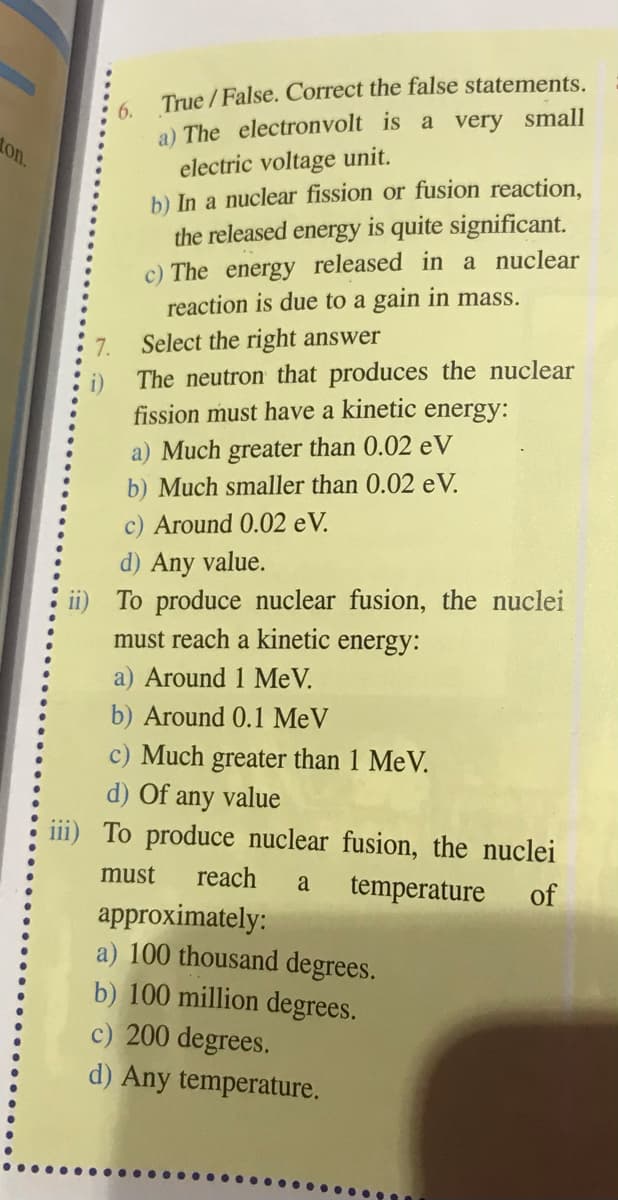True / False. Correct the false statements. 6. a) The electronvolt is a very small electric voltage unit. b) In a nuclear fission or fusion reaction, the released energy is quite significant. c) The energy released in a nuclear reaction is due to a gain in mass.
True / False. Correct the false statements. 6. a) The electronvolt is a very small electric voltage unit. b) In a nuclear fission or fusion reaction, the released energy is quite significant. c) The energy released in a nuclear reaction is due to a gain in mass.
College Physics
10th Edition
ISBN:9781285737027
Author:Raymond A. Serway, Chris Vuille
Publisher:Raymond A. Serway, Chris Vuille
Chapter30: Nuclear Energy And Elementary Particles
Section: Chapter Questions
Problem 15P
Related questions
Question
Help

Transcribed Image Text:True / False. Correct the false statements.
6.
a) The electronvolt is a very small
on.
electric voltage unit.
b) In a nuclear fission or fusion reaction,
the released energy is quite significant.
c) The energy released in a nuclear
reaction is due to a gain in mass.
7.
Select the right answer
The neutron that produces the nuclear
fission must have a kinetic
energy:
a) Much greater than 0.02 eV
b) Much smaller than 0.02 eV.
c) Around 0.02 eV.
d) Any value.
ii) To produce nuclear fusion, the nuclei
must reach a kinetic energy:
a) Around 1 MeV.
b) Around 0.1 MeV
c) Much greater than 1 MeV.
d) Of any value
iii) To produce nuclear fusion, the nuclei
must
reach
a
temperature
of
approximately:
a) 100 thousand degrees.
b) 100 million degrees.
c) 200 degrees.
d) Any temperature.
Expert Solution
This question has been solved!
Explore an expertly crafted, step-by-step solution for a thorough understanding of key concepts.
Step by step
Solved in 2 steps

Knowledge Booster
Learn more about
Need a deep-dive on the concept behind this application? Look no further. Learn more about this topic, physics and related others by exploring similar questions and additional content below.Recommended textbooks for you

College Physics
Physics
ISBN:
9781285737027
Author:
Raymond A. Serway, Chris Vuille
Publisher:
Cengage Learning

College Physics
Physics
ISBN:
9781305952300
Author:
Raymond A. Serway, Chris Vuille
Publisher:
Cengage Learning


College Physics
Physics
ISBN:
9781285737027
Author:
Raymond A. Serway, Chris Vuille
Publisher:
Cengage Learning

College Physics
Physics
ISBN:
9781305952300
Author:
Raymond A. Serway, Chris Vuille
Publisher:
Cengage Learning


College Physics
Physics
ISBN:
9781938168000
Author:
Paul Peter Urone, Roger Hinrichs
Publisher:
OpenStax College

University Physics Volume 3
Physics
ISBN:
9781938168185
Author:
William Moebs, Jeff Sanny
Publisher:
OpenStax

Principles of Physics: A Calculus-Based Text
Physics
ISBN:
9781133104261
Author:
Raymond A. Serway, John W. Jewett
Publisher:
Cengage Learning